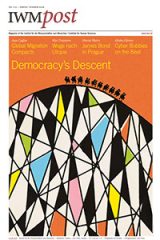

In collaboration with
Institute for Human Sciences
The Institute for Human Sciences / Institut für die Wissenschaften vom Menschen (IWM) is an independent institute for advanced study in the humanities and social sciences. Since its foundation in 1982, it has hosted more than 1500 scholars, journalists and translators from all over the world. Many of the Institute’s Permanent and Visiting Fellows are regular contributors to Eurozine or its focal points The World in Pieces and Ukraine in European Dialogue (see below).
Website: www.iwm.at
Twitter: @IWM_Vienna
Youtube: IWMVienna

Articles

Former communist prisons in Russia, Lithuania, Poland and Belarus have become contested public spaces of memory. With buildings in various states of disrepair or neglect, the redevelopment of several is now being considered. But can they realistically function as both sites of remembrance and mixed-use spaces that look to the past and future simultaneously?

Politics and identity in Belarus
An interview with Nelly Bekus
Belarus and its people are currently navigating complex processes of democratization. From clashes on the streets to intellectual discourse on political rhetoric and media representation, the official line on Belarusian identity comes under scrutiny.

‘Nowadays I often cry’
An interview with Victor Martinovich
Physical violence and political repression continue to torment Belarusian streets. Ongoing activism incurs a heavy, emotional toll. Could solace and stamina be found in literature, metaphysical reflections on the question of evil?

Sadopopulism and the politics of eternity: Shalini Randeria and Timothy Snyder discuss why it’s impossible to talk sensibly about Trump without invoking the history of fascism.
Focal points

Inspired by a lecture that Clifford Geertz delivered in 1995 at the Institute for Human Sciences in Vienna, this focal point engages with ‘deep diversity’, ‘a sense of dispersion, of particularity, of complexity and of uncenteredness’ rather than unified world order. It follows the launch of a research programme of the same name at the institute in January 2023.

Post-revolutionary Ukrainian society displays a unique mix of hope, enthusiasm, social creativity, collective trauma of war, radicalism and disillusionment. With the Maidan becoming history, the focal point ‘Ukraine in European Dialogue’ explores the new challenges facing the young democracy, its place in Europe, and the lessons it might offer for the future of the European project.
Projects and publications

